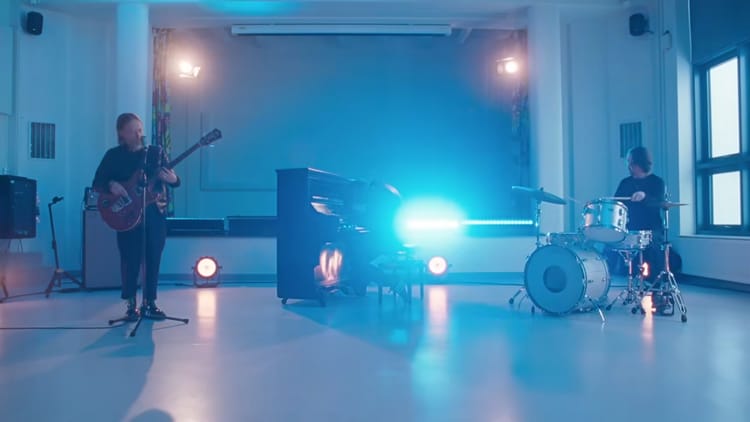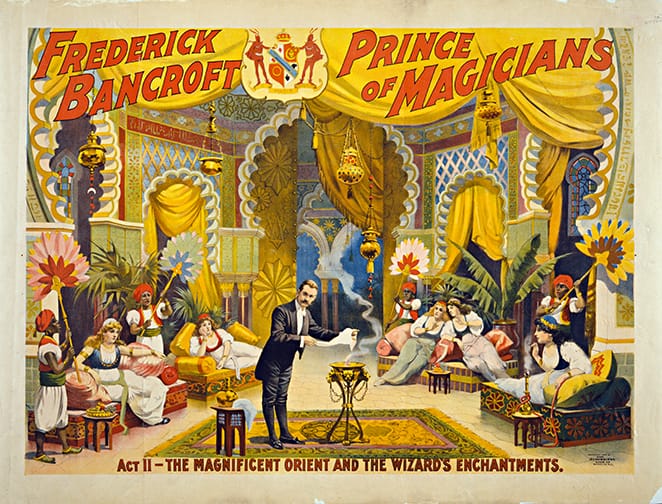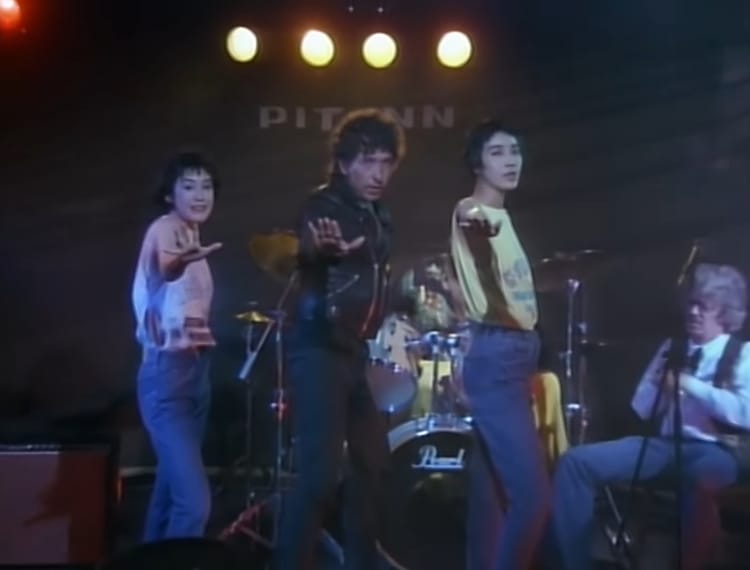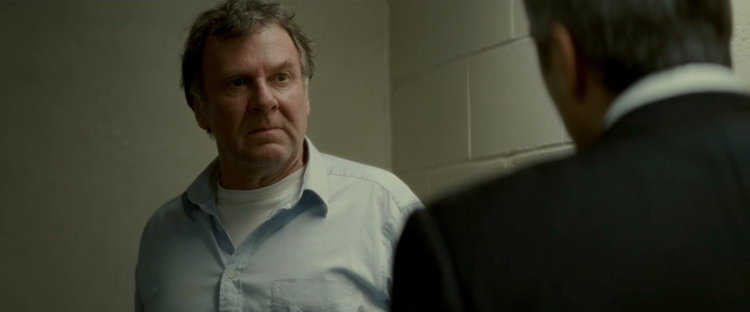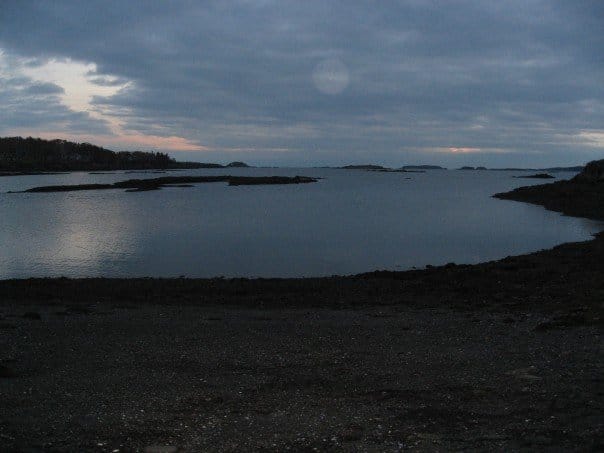A Conversation with Ryan Pollie (Part One)
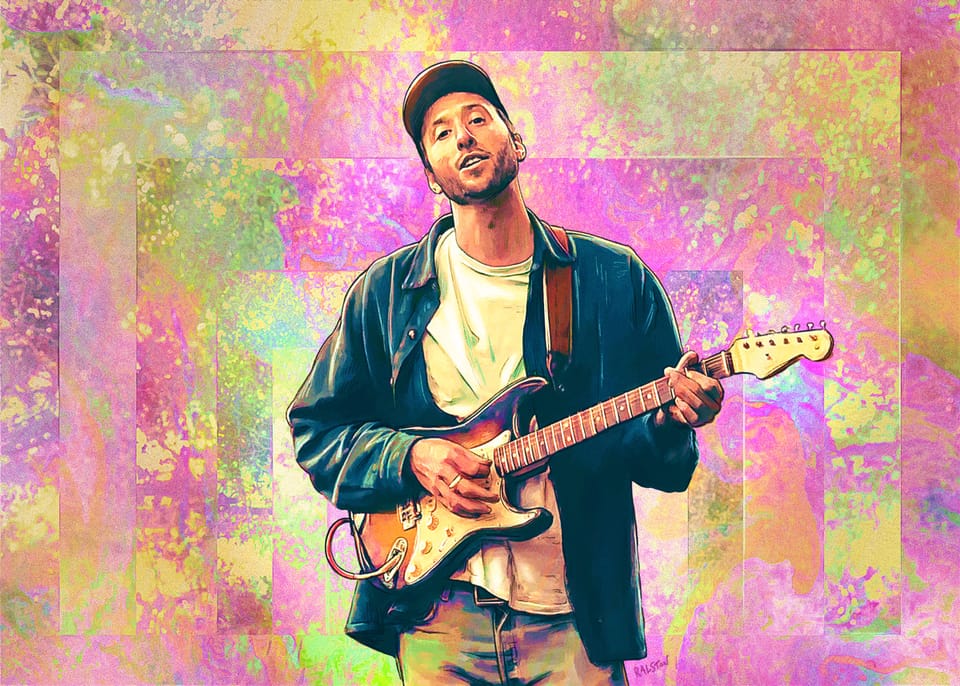
I’m a very lucky person for a variety of reasons, but one of those reasons is this: one of my best friends is also one of my favorite artists.
Paul Thomas Anderson tells the story of first seeing Philip Seymour Hoffman and immediately saying to himself, He’s for me and I’m for him. That was how I felt the first time I saw LA-based musician and producer Ryan Pollie. It was September 2006, I was a junior in college, and my a cappella group was holding auditions. As part of the process, we asked prospective members to demonstrate a special talent. We must have seen juggling, handstands, things of that nature, but I only remember one: this freshman walked in, and with as much confidence as I have ever seen in one person, he announced, “I can convince anyone to go to any restaurant.”
We were stunned, but naturally we had to ask him to demonstrate. Ryan took a breath, centered himself, and then leaned in with a new intensity of purpose. “When you walk into Quizno’s, you’re hit by this smell…” Moments later, we were all craving mediocre chain subs.
From that moment on, I have been fascinated by this man, and I’ve been lucky enough to have a front row seat as he’s developed and honed his skills from a dorm room musician to a studio one. I’ve watched him rack up sterling reviews from Pitchfork, play SXSW, and do so, so much more. I recently had the idea to sit down with Ryan for a long, career-spanning conversation—in the today’s first of two parts, you can learn about his earliest bands, his first two solo LPs, and everything you could ever wonder about an indie musician’s lifestyle and headspace in 2023.
(Note: This interview has been edited for length and clarity)
All right, I have a question for you. What was your first favorite album?
I have a very distinct memory of getting the Backstreet Boys CD and being able to put it into my desktop computer. You could play it in your CD player, but if you put it into your desktop computer, you would be able to double click it, and there'd be a folder in there with a video of the boys doing interviews. I think that's a strong memory because it was this blend of what bonus content and technology could provide, and this full story that you could tell. And that was a big album. That had “Quit Playing Games With My Heart.” So that was a really, really big one.
Were you BSB [Backstreet Boys] over NSYNC?
Yeah, one hundred percent. Although I did see NSYNC play at Disney World in Florida on a stage at the theme park during the day. Like, they maybe played right after the Ninja Turtles show.
[shocked] Were they new?
Yeah, they were new. Those bands were, like - I don't want to say manufactured, because they were artists. But it was an industry driven band. And so I think they were in the theme park circuit before they were global stars.
That's like seeing the Beatles in Hamburg!
[laugh] Very similar, yeah. And so that must have been pre-middle school. Pre-middle school was very pop, very Jock Jams, Britney, Backstreet Boys. And then in middle school, things took a really scary turn towards Kid Rock and Limp Bizkit and Eminem, and that kind of teenage angst and perceived masculinity, forming identity through what you like. It was listening to music that was about intense subject matter and aggression and violence, that was a big obsession for me. But there was a softer side of that with, like, Blink-182 and pop punk. Although they were naughty, too. Just less so lyrically. It was more like, Pee-pee poo-poo, and Limp Bizkit was more like, Let's hurt people.
But I attribute a lot of that to Carson Daly, and what MTV was doing at the time, because they were allowing this guy to have an interview with Britney, or Christina, or Justin, and then the interview right after would be with Fred Durst or with Eminem. And he would really integrate this kind of alternative masculine naughty music into the same countdown on TRL with the bubblegum pop stuff. And that was such an interesting time for music, because Limp Bizkit was making as much money as 98 Degrees was, and that was a really crazy thing. I think especially for parents, because it was just on the radio, and half of the song would be radio edited.
What is the first song you remember writing?
It was in middle school. I was taking piano lessons, and I didn't like playing. I had a real problem with authority from a very early age. I didn't like people telling me how to spend my time.
I know. I used to be in charge of you [as president of our college a cappella group].
[laugh] I used to sit at the piano and have my assignment in front of me, but I would play improvisational stuff, and start just playing the piano, because that was way more fun for me than trying to read the sheet music and make mistakes and study Burgmüller or Bach. And I think as long as my mom heard the piano, she wasn't too intrusive in terms of, Hey, that's not Burgmüller. I think as long as she was hearing me doing music, she was happy. It was harder to show up to my piano lessons, because it seemed as if I spent no time at the piano, and so the teachers would get angry. But I would practice every day—not known to me, I was practicing familiarizing myself with creating on an instrument from a very early age. And so I would string chords together that I liked, and would play them over and over again.
And then in middle school, there was an assignment where I was able to put “I Know Why the Caged Bird Sings” by Maya Angelou into a song, and was able to turn that in instead of having to write a paper. And again, that was an authority thing. It was, How do I make this really easy for me? How do I subvert the teacher’s assignment and do something that is easy? But then I was rewarded for it and encouraged. It was celebrated. And so not only did I subvert the authority figure, but I also got attention for it. So I think that was a really important moment for me to be like, Hey, there might be something here. I hope the rest of my assignments mean that I can just sling together some chords and sing a song and then get an A like that. That's great.
So I think that's the earliest memory of me putting words to music. And then from there, I really, really wanted to get a guitar. In my mind, singing at the piano was not rock and roll. And I really wanted to play guitar and write songs on the guitar. And so I started doing that probably around 13.
And did you have a band in high school? Do I remember that?
In middle school! Yeah, as soon as I got the guitar and was able to play four or five chords, I really wanted to start a band. Because I was watching TRL every day, I was dreaming about Blink-182 every night. It was just what I wanted to do. It was just this drive that I wanted to be in a band. And so I got friends together—it was definitely friends, rather than Hey, who in my class plays music? It was, These are my friends. Let's start a band. And I think one of my friends, Justin, knew how to play guitar. Eric did not know how to play bass, and Anthony did not know how to play drums. But Anthony got a drum set, Eric got a bass, I had a guitar, and we started a band. And we didn't really know what we were doing, but we'd have band practice every week, and people took lessons, and we got better, and started taking it seriously. But when we started the band, it was very much to write songs. Like, we'd cover Weezer and Blink-182, but we started writing songs pretty soon after starting the band.
What was it called? Was it Cereal Heroes?
That is exactly right, good memory. Eric had this early PC game called Worms Armageddon where you'd have this group of worms that went to war with other groups of worms, and you'd have to name your squadron, and you'd have to name each person in your group. And he called his group Cereal Heroes, and then each worm was, like, Tony the Tiger, Count Chocula—you know, the heroes of cereal!
How long did you guys last?
‘Til college.
Damn! Where did you play?
We would play talent shows. We would play other school events. There was an all-girls school, Agnes Irwin—the girls in our class, I guess, weren't as into the idea that we were in a band as the girls from this other school, and they would get us to come and play shows. The earliest big show I remember was this night with a bunch of bands at Agnes Irwin. And it was full, and we were young, and there were a bunch of kids there to see us. It was wild. We had a trumpet player. By high school, we discovered classic rock. From Weezer and Blink-182, it became the Beatles and the Grateful Dead. Instead of spike necklaces and belts and flip cuts, it was hemp necklaces and Birkenstocks—kind of like pot culture without the pot. And then came the pot. But it was the music first.
And then our first love of independent rock, like modern independent rock, was the Shins, and Death Cab for Cutie, and Ben Folds Five. Ben Folds and classic rock kind of reintroduced the idea that the piano could be this texture in rock and roll. And so I would start playing piano and writing songs on piano for the first time.
There was a band in Philadelphia called Pepper's Ghost—the two lead singers drove the buses that we would take to our athletic practices. And they were local heroes, and we would go see Pepper's Ghost whenever we could get in, because we were under 18. And the crazy thing is, I was just working with Eric Slick of Dr. Dog, and he was telling me that members of Pepper's Ghost are now in these incredible Philadelphia bands, specifically the War on Drugs. And I was blown away because we used to go see them at the Point in Bryn Mawr. We played a show with them at Bryn Mawr College. It was the biggest show we had ever played. It was full, it was at a college, we were opening for Pepper's Ghost, but there were more kids there to see us, and it was just - it was incredible. We were mini rock stars in our little town, which was really cool. It was super validating to be able to create things in my head and then get to play them for a big audience of people that were paying attention. Especially because our first memories of doing that, we would fall on our faces. We would try to play a Weezer song and the beat would be two measures late and someone would be playing in the wrong key. Performing was a nightmare for the first couple years, and then we got the hang of it.
So to prepare for this interview, I was listening to Snow Day [an LP Ryan recorded and self-released during college], and you didn't like that I was doing that. Why not?
You know that part in Waking Life where they talk about how cells regenerate completely? It's this table with these women talking, and one of the women says, You know, your cells are constantly regenerating, and after seven years, every cell in your entire being has regenerated, And so even though it's happening a cell at a time, can't we say that every seven years, we are literally a different person than we were seven years ago?
That’s the Ship of Theseus, baby!
There you go. [Listening to Snow Day is] like watching a video of me in college. It's very raw and vulnerable because I have a very complicated relationship with that version of myself. One that I should be kinder to, and one that hopefully with age I will be kinder to. But still, it feels a little bit like an open wound. The music sounds to me - I don't think it's bad to sound like another band. I don't think it's bad to emulate in art. But the reasons behind the emulation are important. And for me at the time, the reason I was emulating certain art was to get certain praise or to get certain comparisons, or to get certain attention.
Who were the artists?
Beirut, MGMT, Grizzly Bear. And now if those bands come up, I have a good enough relationship with myself to be like, That's cool that that came up. But I was stylizing the music. Yeah, I don't know. Maybe it was a knee jerk reaction, maybe if I listened to it, I would be proud of it. I don't listen to a lot of my work.
I think we're all hard on ourselves. And I think artists are trying to grow and grow and grow, and trying to be more singular and trying to develop. And it just feels far away. It feels like literally a different person. So it doesn't feel representative of the artist who I am currently. But I've been going through a lot of cool stuff around that, and in terms of being able to express yourself in not such a narrow voice in terms of trying to be singular, trying to be unique, trying to be like, Oh, that's unmistakably Ryan, and really stretching that to be all-encompassing, and say, Hey, listen to this, I bet you won't be able to guess that it's me. And I've been experimenting with that a lot since I started making doom metal records in my free time, where the fun is to send it to someone, not tell them it's you, say, What do you think? and have them be like, This is really scary. Do you know this person? And be like, It's me.
When did you know that music was a career path? And was there anything else in the mix for you? Or was it just, I'm a musician?
I think that the merging of capitalistic enterprise and career with art is so dangerous, and so destructive, and does way more bad than good for any artist that's out there trying to manage these questions and these thoughts. Very early on, I was spending most of my time thinking about my music and how I want to express myself through music.
When you say early on, what age are you talking about?
I think there were no real thoughts of career until after college. I was in this grand preparation machine—go to a good high school so you can get into a good college, go to a good college so you can get a good job. But the idea of going to a good high school to go to a good college to then throw myself in this career path amongst stereotyped drug addicts and partiers and crazy people was not very academic, was not very “fast track to the house on the hill.” And so it was very hard for me to come to terms with the idea of having a music career unless it was very specifically professional, praised, validated, something that I could show the academic world, or show my parents, and say, Yeah, but I'm not just a struggling musician. I'm a serious musician.
I worked retail, and then I worked for a clothing company at a desk job for years and years and years, while I was signed to a label, to show myself and the perceived outside world that I was stable, that I had a job, that I was on some sort of career path. And the music was this bubbling thing of wishing and wanting so badly to have that opportunity to say, I'm a career musician, but it not coming, even with the record deal. And so it's always been a struggle. I still try to not look at my output as a career. I still try to not look at producing and making music as a job. I need money to keep doing it, but that's it. I need enough money to keep the wheels turning. But it's not this game in terms of, like, How am I doing with the career and the money? I try not to let that reflect on the actual work, because there's just so many lessons I've learned over the years and so many stories I've seen of amazing artists—not just within music—that have this incredible output, or even just one thing that's incredible that just doesn't make money. It's the idea of money as a reward system for work—I mean, you could be in any job and learn this lesson.
The idea of work is very confusing. In terms of being an artist, you have to really do a lot of thought there. Because I've learned through my experience that time is a really important resource. And I think that was my problem with authority from an early age. Don't tell me what to do with my time, because time is all we got. And so that's really it, is trying to get to a place where I can spend my time resting, being with friends and family, or creating, because I think that's what gives me the most—gosh, there's not a word for it—specialness or fulfillment in my life. And so the idea of being a career musician more meant making enough money to do it and do that alone. And that was always something, and still something, that I strive towards, but less so now to show everybody that I've done it and I'm professional, and more just so that I can do it.
Why did you move [from the east coast] to LA?
The idea of art as a lottery ticket comes up a lot. And I know that's a messed up thing to do. And that's another issue, but it feels like that sometimes. Where it's like, yeah, you can be a great artist, you can have great stuff. But by doing it, you're still playing this game of capitalism that isn't very nice to artists. I definitely am not anti-capitalist to the point where I don't want money, because money affords me the ability to spend my time. And that's just the nature of it. But it's not like I'm only driven by money, or fame. But if you want those things, I would liken it to playing the lottery. No matter if you are the most attractive, best actor, if you want to act and you want to make it in Hollywood, you're still playing the lottery. And I think a lot of famous actors would agree with that. Even after saying, Well, I worked really hard, well I did this or that, no matter if you do everything, it's still hard. And I think if you're buying lottery tickets, and someone says, Well, you have a better shot at winning this lottery than this lottery, you're gonna buy the lottery ticket that you have a better shot of winning. And I think LA was this idea of, Well, it's a long shot. But LA is the place where the industry is, LA is the place where people go to make it in their creative field. And I had a really good friend that wanted to go make music and wanted to be in LA to be a screenwriter anyway. And he had a really good friend that wanted to go be in the creative field of music and start a band too. And the other options just weren't anywhere near as attractive in terms of the music idea.
When I was that age, I wanted fame. I wanted the attention, I wanted the validation. And I knew that being in Philly, or even New York, was going to put me down a rung as opposed to being where the magic was happening. If you want to be an actor, maybe you should be in Hollywood. If you want to be a musician, a rock star, you should probably go to LA It doesn't make sense for you to go to Kansas. And that was just the reality of the situation. I was hungry for it. And so, yeah, that made the most sense. And I was also toying with the idea of potentially being in the industry—Maybe I want to be A&R, maybe I want to be a label person or something.
People handle creative pressure differently. I think some people make great art when there's no pressure. For my output, it was productive to be around other people that were doing it. And it really threatened the specialness of it for me, of being that guy in a circle of friends who's the musician or the songwriter, because pretty soon it was, Everybody I know is in a band and everybody I know is writing songs. And that was really hard. But it was also really inspiring.
I'd imagine the high dropout rates at conservatories have to do with this. I'm the first violinist at my school, and now I'm in a class with 10 first violinists. It’s really difficult, but I think it was really humbling. And it was a good journey for me to take, to be in a city where everybody else is this bizarro version of myself and has a similar story where they were a songwriter and are in LA trying to make it. So it really takes that specialness away, but makes you look for specialness in other places.
So you mentioned a friend who moved to LA who wanted to make music. That was Justin [Lerman] right? And with Justin and Brendan [Lynch-Salamon] you formed a band called Warm Weather. Could you tell us a little bit about Warm Weather?
It was three songwriters. Prolific songwriters. You could put a guitar in their lap and they'd write a song. And it was this high bar in terms of OK, well, what's gonna be our songs? And it was democratic in the way that we would write lyrics together, we would decide which songs we wanted to work on. It was very harmony driven, very maximalist. It was kind of like a painter who was used to painting with mud and then someone showing them the keys to an art studio and saying go at it. We had each other's brains to accomplish things we couldn't have accomplished on our own. Every time you sang, you had two other voices to sing around you. We had production capabilities through Brendan that were never afforded to us before that. And we had my drive to make us cool and important and validated. That's a big throughline is me dealing with whatever was in me since I was a kid of just needing to be special and needing that attention through my music. That started at an early age, but it was definitely carried through Warm Weather, too, to the point where we were making no money, but we took it as seriously as anything I've ever taken seriously. It was very, very serious.
We did a couple EPs, and we were so proud of them, and I still am. It was emulating certain bands in a sense, but it felt new. We were at the age where we would go play a show and everybody wanted to go out. Everybody wanted to party everybody wanted to be drinking and if it was a Tuesday night in Santa Monica, who cares? Let's all go. We did a tour where we played colleges, and I got to play our college, and it was wild. Being that age and being good was special for us. We were rewarded for it, we got to play for full rooms, and we felt like rock stars.
And during that time, we were figuring out, again, that time is a resource. That was starting to become this sense of conflict in terms of one member of the band saying, you know, I also want to be writing screenplays, and one member of the band saying, I have a serious girlfriend, I kind of need tonight to hang with her. And me being like, I do not have a single thought other than this band. We were developing into these ideas of, OK, well we have this one life, what do we want? Do we want this? Do we want that? At what cost? And I was writing every other day. And because it was a democratic band, it was hard to keep up with the amount of writing that I was doing. I would submit five songs a week. But there were two other songwriters in the band. And even though I would take advantage of them and weasel my songs in to be the centerpiece of the band, it wasn't supposed to be the Ryan show. And I needed something to be able to keep up with the amount of output that I was doing. And I needed a Ryan show.
And that slowly became clear to me, that one of the reasons the band wasn't working was because I needed it to be mine. And that was a harsh reality to come to terms with in a positive, productive way. Because I had to work through that with two very close friends. But it was clear that I was shooting off into the stratosphere in terms of needing music to be my thing. And so I started compiling these demos, and started entertaining the idea of also having a side thing to the band. And as that started picking up steam, Warm Weather started dissolving to a certain extent. And at first it was like, Hey, this is my thing. This is totally separate. And I think that was important at first, but then I invited them to join my band. And I think in some way it was a relief because it wasn't theirs, so they could be a little bit more like OK, well I can go see my girlfriend, or, I can go write a screenplay and I can show up for practice. I was holding them to a certain amount of, Hey guys, we need to have band practice tonight. Hey, we need to have a band meeting. We need to do this, we need to do that. And I think for them to need to keep up with that was a lot of pressure that I was putting on them. And I think to be like, Well Ryan, this is your thing, we're just playing instruments in it, hopefully provided some sort of relief in terms of, I don't need to match that. I can just be in the ensemble. And so it was healthy for me, too. And so that's when the first Los Angeles Police Department album came together was demoing songs to submit to Warm Weather and just not being able to get them through that process. Because it took more to get us three together to work on something than it did for me to come home and make a song. So it was an easier process and easier output.
You mentioned [your first name as a solo recording artist] Los Angeles Police Department, so let's talk a little bit about that. We'll do it as one question: Why’d you choose the name? Why'd you ditch the name?
Well, I think we can follow that through line with my problem with authority. My wanting to subvert expectation in terms of, like, creating a name that is - Are you gonna get sued for that? Are you allowed to do that? It felt punk, but looking back, it felt naive. It was something that, from a white, male, young perspective, felt interesting, challenging, and anti-authority in the right ways. But as I started to gain perspective on it, it felt like anti-authority in the wrong ways. And that was a really tough thing to go through. But I think it's important to admit when you're wrong, and it's important to grow, and without mistakes, you don't grow. I forget who I just heard say, Oops is the sound of progression.
I was realizing that I wanted people to know me, and I was writing very personal stories. And so I was able to take comfort in the fact that that was the reason behind the name change. But it would be a lie to not say that I was really struggling with the idea that I had made this decision to name my music after a terrible organization that I didn't align with in any sort of way. If I was in a band that was punk enough to be saying, you know, Down with Ronald Reagan, I'm just tired of living on the streets - like, if I had this lived experience to really stand in opposition to what the police department was, then maybe it would make more sense. But I came from a middle class background. I didn't have trouble with the police. It was always just songs about love and anxiety. And so there was this cognitive dissonance there, and it tormented me. And I took it very seriously, and was very scared around it, and felt that I'd dug my own grave and was really down on myself. Every other day on the news there'd be a new shooting by the police or these horrible things that were happening in our country at the hands of the police. It was like, OK, I'm gonna come out with a single next week. Oh shit, the day of my single there was a shooting by police in Los Angeles. And so there was no choice but to wake up and admit that this was not the name that I wanted to stand behind. But it also maybe opened up this idea of, Oh, maybe I'm not one thing. And maybe I can grow, and maybe this is a new thing, and then I'll do another thing. And I think that it encouraged me to maybe overcompensate, and say, Well, if I had this one band, and now I'm this solo artist, maybe I'll make another band, maybe I'll do this project, just to compensate for the idea that it's not just Los Angeles Police Department and Ryan Pollie, I am multitudes. And so maybe it worked out for the best.
But yeah, there's a lot of regret and a lot of self judgment there. And in the grand scheme of things, nobody cares. And nobody really knows those records enough where it was a challenge. But there was definitely a feedback loop, especially with writers, of, Hey, check out my new song, here's my band name, and people being turned off from the music just by looking at what the band name was. And like, you know, you could write amazing beautiful songs, but if you call your band Hitler, maybe I won't click on it, because it's triggering, and that was the last thing I wanted. I wanted to be cool and anti-authority, and I wanted you to be confused, and I wanted you to not be able to Google me, all those things—like Real Estate mixed with, like, Strawberry Alarm Clock, these long names. But yeah, swing and a miss, I think.
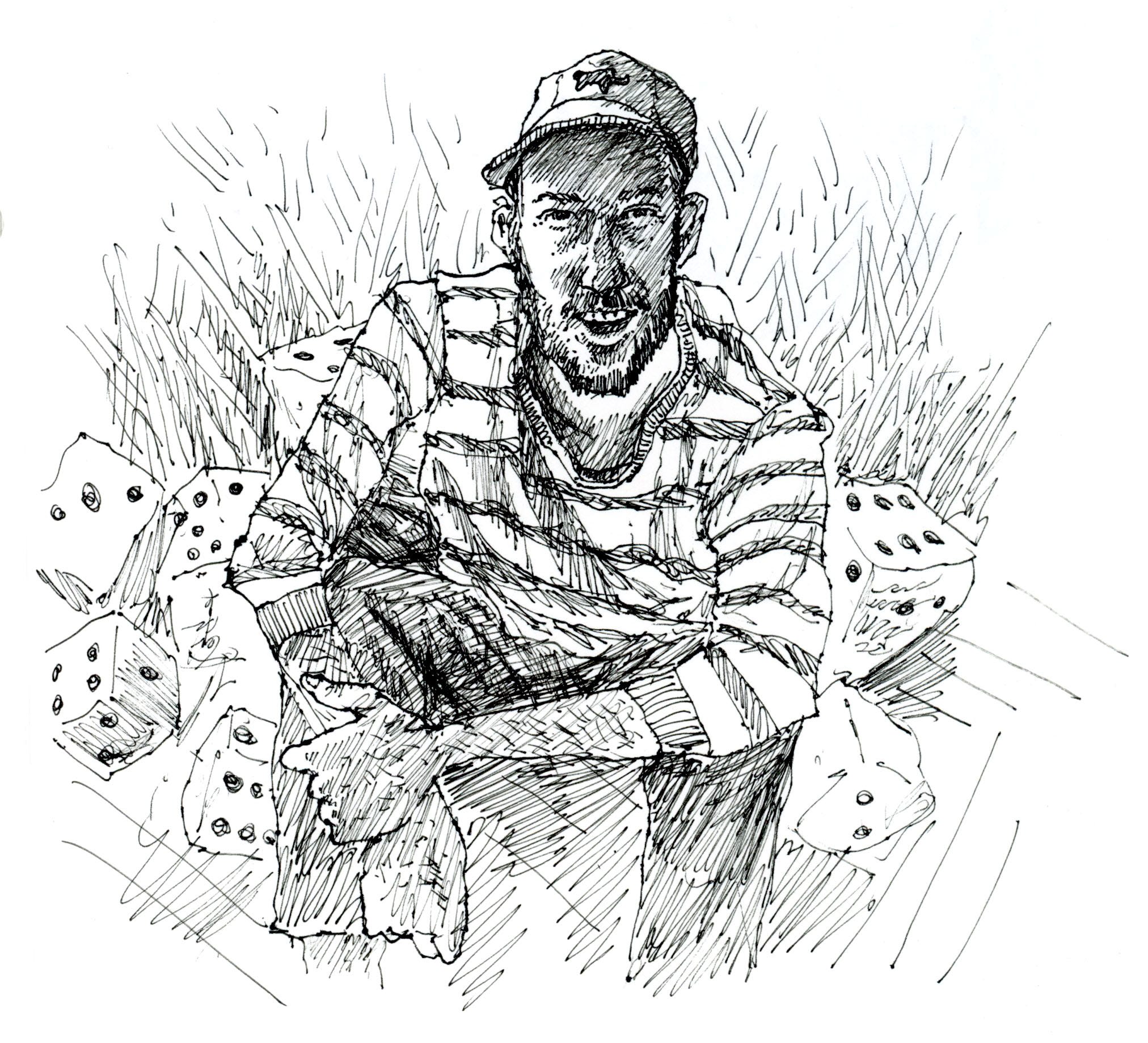
So your first three LPs—LAPD one and two, and Ryan Pollie one—none of them have titles. Why is that?
Well, the first two, I felt like the long band name - A Long Walk on the Beach by Los Angeles Police Department was just a little wordy. And then my first solo album felt like I wanted to draw attention to the fact that it was me this time and not the band. I think that's why that happened.
So your first LAPD LP—I don't know if this question is gonna even make sense, but I'm curious: do you feel like that album is “about” anything?
Not lyrically, necessarily. I mean, there's a lot about relationships and anxiety, because I can look back in time and notice my anxiety disorder popping up in life and dealing with it in ways that didn't look like therapy or medicine. And then after moving to LA, at a certain point, my anxiety disorders were all-pervading, and really telling me, Hey, this is not something you can get through. You need help. So sometimes I can hear the anxiety in the material, personally. And then it was the first time I ever made stuff by myself for myself, and wanted it to sound like a rock band. Everything I'd done before that on my own was electronic based, and was orchestral based. This was the first time I wanted to use guitars, bass, drums, and make an album that sounded like a band, but was me. And so that's the through line there. And I know that sounds strange to be like, Yeah, the concept is a rock band, because there's a lot of rock bands. But it was very new for me to try to do.
Doesn't sound strange to me. There's an interlude on this album, which I always think is an interesting gesture. What's the function of an interlude, the 25-second instrumental track here?
We got an organ in the house—this big organ that was in our living room and stayed there for years. I wrote a lot of songs on it. One of the songs was “Bishop’s Road” that's on that record. And so it was a new texture for me, this organ. And when I’d sit at it, I'd write these things that wouldn't necessarily turn into songs, because they were more instrumental keyboard driven, and they didn't sound like what I wanted to write with my songs. But nonetheless, I would spend a half hour or an hour playing them, and I'd like them.
The instrument really guides the writing a lot of the time, and the organ was making it sound like - there's this specific part in Ocarina of Time, the Zelda game, where you go into this weird room, this indoor wooden structure, where this guy has this wooden wheel that he's turning and spinning on, and this carnival organ music is playing. And it was like, Oh, that's kind of the vibe there. And I always loved concept albums, rock operas, things that allow for these interlude spaces, and that's always been a part of my brain. The albums that I want to create have a little bit of theatricality to them.
Your “Sparks,” so to speak. Your “Underture.”
Sure. And to me, if I was calling all the shots, if I get to make the art how I want to make it, stuff like that is important to me. Found sounds or little pieces, stuff like that. I think it's compelling. It was very collage-y. So it really made sense to me.
Who drew the cover art? What does it signify?
That's another reason why I didn't want to give the album a name, because the artwork ended up being so strong. Through my job, I got to work with a lot of graphic designers, and a lot of graphic designers work on the computer but have a background in illustration. And this specific guy, Christian Escalante, grew up very much doing things by hand, and then landed a job on the computer and did a lot of computer work. But his drawings were so good, he would create these fun characters and these worlds on the page with his pen. But that was something that he thought of as to the side. He didn't show a lot of people, and the only reason I was privy to it was because I would be so distracted in meetings that I'd look over at him and he'd be doodling them. And I think he responded to the fact that I was so driven to make art and to release art and to start this journey as a kid—because he's older than I am. And I think he saw that fire in me and wanted to nurture it, and was willing to create this fantastic art for me for no money just so that he could help.
I was really into some gnome drawings that he had done. You can see the humanity in them, but they were different than humans. And we came up with this idea together about what we were feeling about capitalism, and society, and art at the time, which was this idea that these gnomes on the front cover, in this society, were their workers. And they're working to dig out this magic dust from the earth, this natural resource. And then on the back, they’re going to the bar to get served this magical dust, and getting high off it, or drunk, to make them forget about their day at work. And so it was this cycle that maybe subconsciously we were feeling, the idea of going to work, getting the money so that we can go home and spend the money on beer, pot, or the time to make our art.
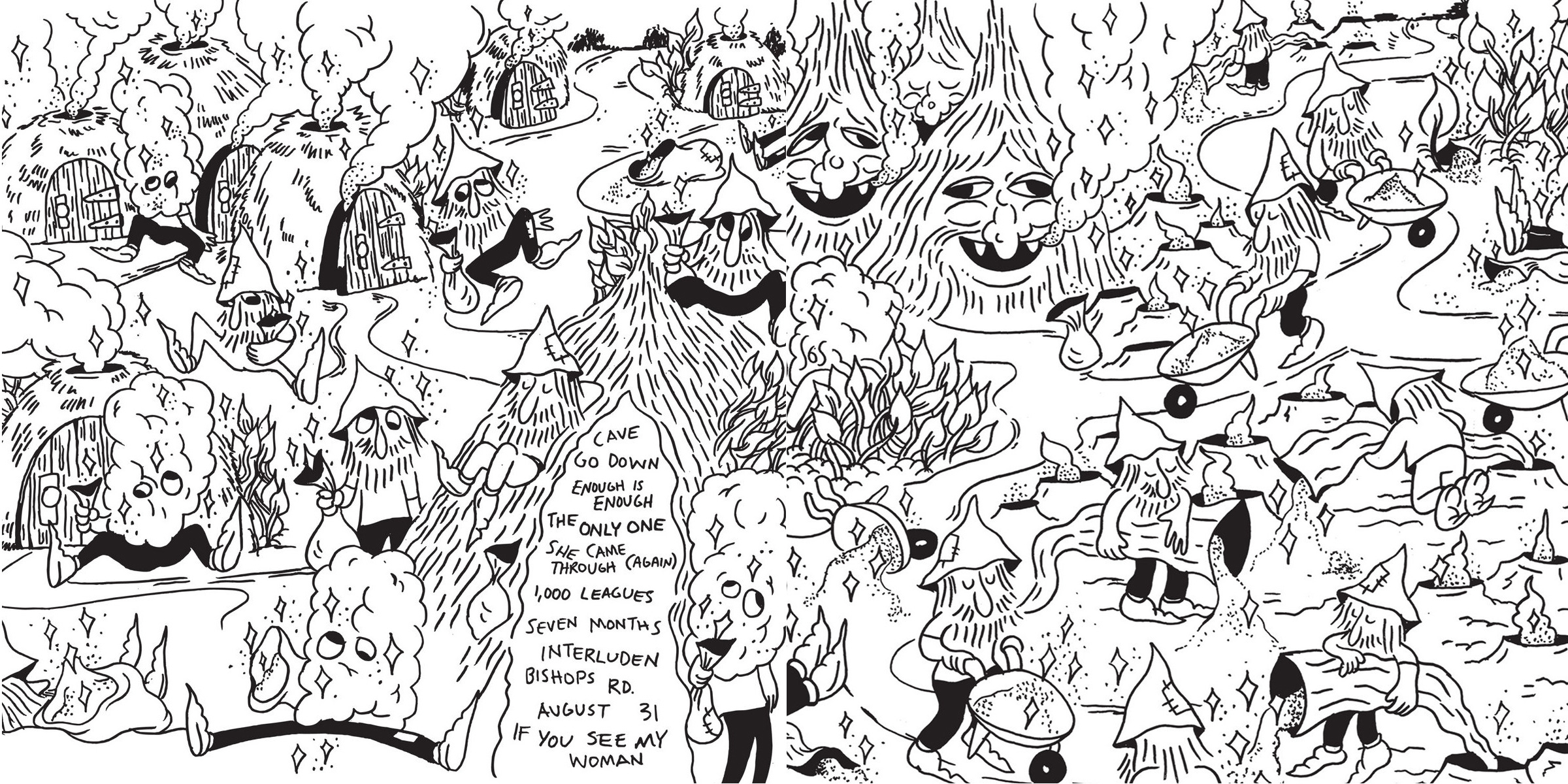
And I think we were both fighting that system of being artists in a capitalist environment. And I think it was also able to be a heavy handed social commentary while just reading, on a surface level, very fantasy. You have smiling mountains and beautiful streams. It was very meaningful for me. It's the only tattoo I have, the gnome with the magic dust in his wheelbarrow. The specific guy I have, his eyes are kind of closed. And the magic dust is obviously magic, but it's in this wheelbarrow, and he's just pushing it. It's like the magic is there for us all to discover. But we've come up with all these systems and infrastructure and rules so that we forget what we're even doing.
If you make a song or an album, and you imagine the ideal listening situation for it, would you like somebody to sit down with headphones on and just listen for an hour? Would you like them to be driving? Doing the dishes? Does that not matter to you?
I’ve thought about this a lot. I think the answer depends on the material. I think with song, you have a lot of chord changes. You have verses and choruses, sometimes even bridges. You have a guitar solo, you have words to digest, you have harmonies, and the way that I make songs, oftentimes, is maximalist, there's a lot to listen to. And so the idea of doing that and someone talking through it would have made me say, Hey, you're not really listening, shut up. It needs your attention. And I think a lot of music does. And I think as a culture, we've gotten used to the idea that you can go to a restaurant, and one of my songs could be playing, and you're supposed to eat and talk through it. But as someone who's grown up with ADD, it's always been really difficult for me to do that. If there's a song on that I want to listen to, but I have to do something else, it's difficult for me to do. Especially in school, trying to study or trying to read, but listening to a lyrical song—there's no shot. Even classical is very maximalist, and oftentimes has a lot for you to listen to. And so I think the idea is you're supposed to be quiet. You're supposed to put your attention on the music and you're supposed to listen to it. And sure, that can be driving, because you're quiet, or cooking. But it's not talking. And it's not doing something like reading where you're supposed to be focused on these words on the page, but also there's words being shouted at you. That just never added up to me. And maybe people have that skill and can appreciate popular song in that way. But it was never me, and it was always really challenging for me to have people talking in a crowd. It still is.
When you have popular song, and there's a message trying to get across, especially lyrically, it demands more of the listener than people realize. And I think people should encourage that behavior—Hey, I have a new album out, but you're gonna need to sit down and listen to it. You're not going to be able to do all your chores and think about all these other things while doing it. It's music that demands your attention and deserves it. But I was just sick of demanding that of people at a certain point. It's like putting out a book—you're not gonna be able to drive and read the book. You know, you gotta read the book. So I think the ideal situation for an album of popular song is to listen to it where you can focus on it, in whatever situation that may be.
So do you see a progression between albums one and two? Are you a different artist by the time of the “plane and birds” album?
Yeah, because I had a record deal, and had money to work with a producer and a mixer. So again, it's less the material itself. I write songs, and I'm not like, Wow, this song is way different. I think we all have our own voice, and we all grow and change, but you're still gonna still write like you and I'm still gonna write like me. And this batch of songs I did in the same way, where I was getting better as a producer in my own right, and getting more equipment and more weird keyboards. After the first record, I really wanted it to sound like a guitar band. It was very guitar heavy. I think the second record was integrating more synthesizers and keyboards back into my sound, but in this kind of lo-fi DIY way instead of trying to make them sound really huge. And so I had the full album done, and then I redid it, treating those as the demos. But taking the home recordings and doing them with the producer of my choosing was incredible, to be able to have the money and resources to be able to work with heroes. That was an experience I'd never had, and so that's that record for me—having the first experience in a home studio with Jonathan Rado. That showed me a natural progression that I could identify with. It wasn't, Ryan, you're at home recording right now, and the next step is you in this fancy sterile studio with a giant console making pop. It was, Oh, I'm over at this guy's house. He does what I do in that he smokes weed and records music at his house. But it's a step, it's evolved. It's something I don't like better or worse but there's more at his fingertips. There's a new perspective here. There's a new challenge here. The gear is way better, and it's more complicated. I've never worked with gear like that. What is this microphone? How did you get that drum sound?
And so that really started my obsession with the idea of getting better at recording myself, and not leaning too hard on lo-fi. It really lit a fire in terms of me being like, Oh, I want this. I want to have more toys. I want to have more microphones. I always felt a really big division between engineers and recording enthusiasts and artists. And I felt like I couldn't be both, that I had to be an artist that records shitty, or someone who records really well that focuses on that and doesn't focus on their art. So this idea of being a musician/producer I was not familiar with until I met Jonathan Rado. And he really inspired me. I wanted to self-produce to his capacity, and he really sent me on my way and and then I was able to work with Rob Schnapf to mix it, who is just at the top shelf of recording engineers who have ever lived. I felt impostor syndrome, and I felt like, Hey, now you're on the New York Yankees. The experience with Rado was comfortable enough where his music was wildly impressive to me, but the home studio situation was something that felt comfortable. Whereas with Rob, it was, Welcome to the big leagues. I was as comfortable as it could have been, but I was wildly uncomfortable at the same time. Just being like, Wow, I can't believe he is working on my music. That was very intimidating.
So yeah, the difference between those two albums was just that the first album I did by myself and did the best I could, and the second album, I had money and a label to make something better. And that was a bad word, but that's what I was trying to do—trying to make something better, and hire people to make it better. But at the end of the day, I got less press and less attention for the second one than I did the first one. And it was really confronting to have spent all that money and that time and to not be rewarded for it. But looking back, I know now how important that was for all the reasons I couldn't tell at the time, which was to spark my love of recording.
Did Christian do the art again?
Mm-hmm.
And this time you were actually illustrating some of the songs, because bird and plane imagery recurs throughout. You’ve got two songs called “The Plane” and one song called “The Birds.” Is that about anything? That imagery, birds and planes?
My generalized anxiety disorder was manifesting in life threatening situations, or creating them for myself. So driving past buildings thinking they were going to fall on me. Being in buildings thinking there would be an earthquake. Going on road trips thinking we'd crash. But the panic attacks would come when I had a flight coming up. And there was a memory from college where we were flying over the Rockies and the plane probably didn't drop more than however many feet, but it felt like it was going down. The lights were flickering—no oxygen masks, but the bags were falling out of overhead compartments. People were praying and screaming. And I thought I was gonna die. And I remember turning on How High, because I liked the idea of, like, playing a hand against God. You won't kill me while I'm watching How High, that'd be too ironic. Trying to make the situation absurd in order to not make it make sense for history. And so planes became really significant in my life, and still are, and it's actually linked to my love of ambient music. Ambient music has been so helpful and healing for me in terms of anxiety. So I knew that I wanted to center the artwork around planes because I'd written those two songs. And I forgot about the song “The Birds,” and I forgot that there was a throughline there, but the idea was similar to the first album, that there was a horrific plane crash on the front cover, and a plane being taken apart by these birds in the sky. But when you look closely, the birds aren't doing that to kill the people. They're not doing evil. When you look on the back, they've created a nest for their young out of the plane parts.
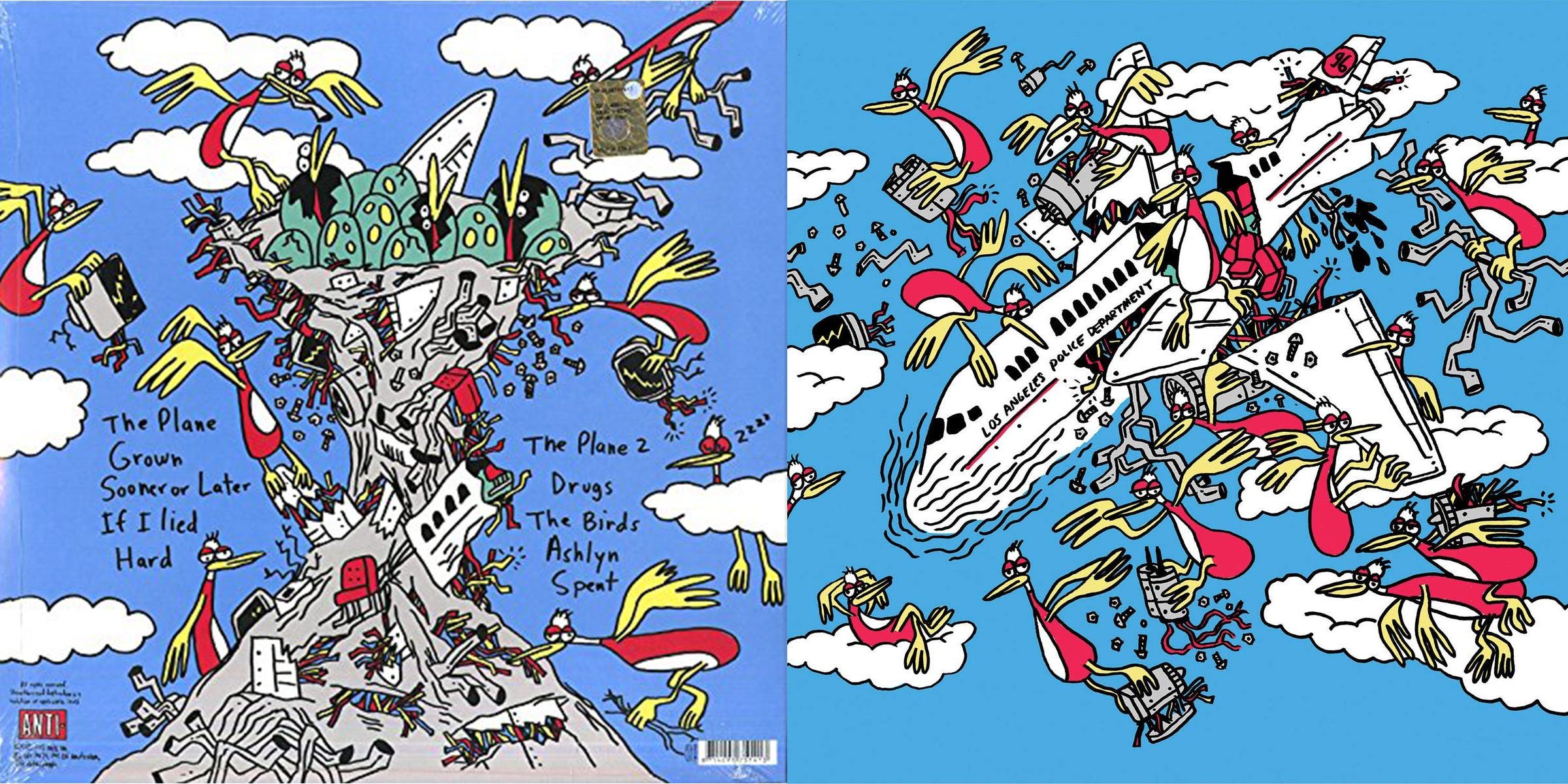
And it was this idea of, what I was perceiving as terror, to a bird is not terror, or to another person, and this idea of taking a step back and looking at the trivial nature of my fear. And also playing into that playing a hand against God [thing]. Am I really going to die in a plane crash if I put a plane crash on the cover of my album? The idea of synchronicity, and forcing synchronicity or coincidence, maybe would give me a better shot at not having to go through that. But then again, you read about synchronicities all the time, where people who created this part of a jet engine ended up dying because of it. That happens a lot. But yeah, it was kind of me facing my fear, or trying to write this different history for myself and this different fate.
One more question on this phase, and this is a self serving one. I'm curious because I don't remember. There is a song on that album that is inspired by some writing of mine. “Ashlyn” is on this album.
For the reader: I tried to write a novel that never existed well as a novel, but that existed well as, like, oral storytelling that I would just sit around and tell you, or tell other people. And it was something people liked to hear me spin, this little ghost story I had come up with. So how did you take that and run with it into your own thing? I love it. I'm very excited by it still. But why?
I just remember being so enthralled and thrilled by this idea that you were telling me, and the pages that I eventually read, and this whole world that you created. It’s still one of my favorite stories I've ever heard. It was literally haunting, and figuratively haunting. It was a ghost story that stuck with me. And when I write, I don't tend to sit down and write about something. I try to honor the words that come out even if I'm judgmental of them. And I've always been pretty good at that. And so when I get praise for my lyrics, I'm always like, What? They're just the first things that came out. But then oftentimes I'll appreciate them with age.
And that song was personal for me, so it came out as that, but then looking at the lyrics and listening to the song in the following days, it was very clear that it was also inspired by you, and it was inspired by the story that you told me, as much as it was about my own personal life and the difficult feelings that I was experiencing at the time. And it was just a no-brainer to pay homage to this great story that you had written. And the ghost in my story was a woman, the ghost in your story was a woman. The man in your story was a musician, I was a musician. It was clear. It doesn't even strike me as a choice that I made. It was just the obvious thing. This is not the same ghost, but surely there are enough parallels here where it's my version of her.
It's funny, there was a TikTok trend where it said use streaming services to find your name in a song. And because it's such an uncommon name, every Ashlyn that would search their name on Spotify or whatever, my song would come up. And the challenge was, you’d film yourself on TikTok listening to the song for the first time. And so the first line is, I fell in love with a ghost, and all these girls would say like, Aww, and you'd see it in their face, they’d be like, That's a cute idea. And then the next line is like, She died in a bathroom or something like that -
She drowned in the bathtub!
[big laugh] And so you'd see their faces change. And it really was a great thing to experience in terms of that medium of TikTok, just watching someone's initial reaction in real time to listening to this song that they were ascribing to themselves. I am Ashlyn. They're like Oh, this is cute, maybe I do like this, it's about me, and then immediately just being like, Oh my God, that's horrifying!
Be sure to come back next week for the second half of my conversation with Ryan, in which we talk about his self-titled LPs, his new theatrical and ambient work, and our own current collaborative project.
